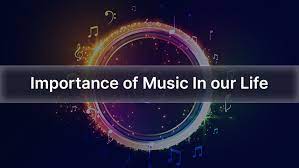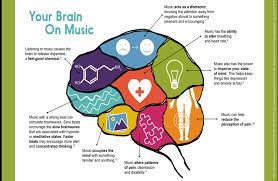Music and Mental Health: How a Good Song Can Boost Your Mood
Music is an integral part of our lives, providing us with moments of joy, relaxation, and inspiration. From upbeat pop hits to soothing classical compositions, music can lift us up when we’re feeling down. In this blog post, we will explore the role of music in mental health and discuss how a good song can help to boost your mood.
- The Role of Music in Our Lives
- The Relationship Between Music and Mental Health
- The Benefits of Listening to Music
- The Different Types of Music That Can Help
- How to Use Music to Boost Your Mood
- Music for Boosting Productivity and Focus
The Role of Music in Our Lives

Music is an integral part of human life. From ancient times to modern-day society, music has always been a form of expression, communication, and entertainment. It has been used in celebrations, rituals, and events to bring people together. However, the role of music in our lives extends beyond just entertainment and socialization.
Music has a powerful impact on our emotional and psychological well-being. It has been found to influence our mood, behavior, and cognitive abilities. The reason for this is that music activates the pleasure centers of the brain, releasing dopamine and other feel-good hormones that can improve our mood.
Moreover, music can also serve as a coping mechanism, helping us deal with stress, anxiety, and other mental health issues. It can provide us with an emotional outlet and a way to process difficult emotions. In fact, many people turn to music during times of crisis or when they need to escape from reality.
Overall, the role of music in our lives is multifaceted and essential. Whether we use it for entertainment, socialization, or emotional support, music has a significant impact on our mental and emotional health. Therefore, it’s essential to prioritize listening to music and making it a part of our daily routine.
The Relationship Between Music and Mental Health

Music has been found to have a powerful effect on our mental health. Studies have shown that listening to music can help reduce symptoms of depression and anxiety, improve mood and increase feelings of happiness. The relationship between music and mental health has been the subject of much research, with a growing body of evidence suggesting that music can play a key role in improving our overall well-being.
One of the ways in which music can impact our mental health is by reducing stress levels. When we are feeling stressed, our bodies release the hormone cortisol, which can have negative effects on our health over time. Listening to calming music, on the other hand, has been shown to lower cortisol levels, helping to reduce stress and promote relaxation.
In addition to reducing stress, music can also help improve our overall mood. When we listen to music that we enjoy, our brains release dopamine, a neurotransmitter that is associated with pleasure and reward. This can help us feel happier and more positive, even when we are dealing with difficult situations.
Moreover, music has been found to be an effective tool for managing symptoms of anxiety and depression. Research has shown that listening to music can help reduce symptoms of anxiety, such as racing thoughts and rapid heart rate, while also increasing feelings of calmness and relaxation. Similarly, listening to music can also help improve symptoms of depression by reducing feelings of sadness and hopelessness and promoting feelings of joy and positivity.
Overall, the relationship between music and mental health is a complex one, with many different factors at play. However, the evidence suggests that incorporating music into our daily routines can have a positive impact on our overall well-being, helping us to reduce stress, boost our mood, and manage symptoms of anxiety and depression. So the next time you’re feeling down, why not try turning on your favorite song and see how it makes you feel? You might just be surprised at how powerful music can be.
The Benefits of Listening to Music

Music has been a part of human culture for thousands of years. It has been used to express emotions, tell stories, and connect people across time and space. In our modern world, music plays an important role in our busy lives. From upbeat workout playlists to calming instrumental tracks, music is a powerful tool that can impact our mood and mental health in numerous ways.
Studies have shown that listening to music can have a variety of benefits, including reducing stress and anxiety, improving mood and focus, and even lowering blood pressure. It is no wonder that music therapy is a recognized and effective treatment for various mental health issues, including depression and anxiety disorders.
When we listen to music, our brain releases dopamine, a chemical that creates feelings of pleasure and happiness. This can have a positive impact on our mood, helping us to feel more energized and motivated throughout the day. Music also has a way of bringing people together, creating a sense of community and belonging.
Different types of music can have different effects on our mental and emotional state. For example, upbeat music with a fast tempo can boost energy and improve mood, while slow and calming music can help us relax and unwind. Lyrics can also be powerful, as they can inspire us with positive messages or relate to our own experiences.
Whether you listen to music while working out, driving, or just relaxing at home, the benefits are undeniable. It is a simple and effective way to improve your mental health and overall well-being. So why not make music a part of your daily routine and see how it can positively impact your life?
The Different Types of Music That Can Help

Music can have a profound effect on our mental health, and the type of music you listen to can play a big role in determining the kind of mood you experience. Whether you’re feeling down and need a pick-me-up, or you need to calm your mind and focus, there’s a type of music out there that can help you.
Upbeat music is great for improving your mood and energy levels. It’s perfect for those days when you need an extra boost of positivity and motivation. Upbeat music can help you get moving and feel good about yourself. Some examples of upbeat music genres include pop, hip-hop, electronic dance music (EDM), and rock.
If you’re feeling stressed out or anxious, chill music can help you relax and calm your mind. This type of music can help you slow down and take a break from your busy day. Chill music can include genres like ambient, jazz, classical, and instrumental music.
Motivational music is perfect for when you need to get work done or need a push to achieve your goals. This type of music can help you focus and give you the drive you need to get things done. Genres that are great for motivational music include rap, rock, and pop.
Nature sounds, such as the sounds of the ocean, rainforest, or birds chirping, can have a calming effect on your mind and body. They can help you relax and reduce stress levels. Nature sounds can be used in meditation, yoga, or simply to help you unwind at the end of a long day.
How to Use Music to Boost Your Mood

Music can be a powerful tool for improving your mood. Whether you’re feeling down or just need a little pick-me-up, listening to music can help. Here are a few ways you can use music to boost your mood:
- Create a playlist: Make a playlist of songs that make you happy, or that remind you of good times. Having a go-to playlist can help you quickly access music that makes you feel good, whenever you need it.
- Dance it out: Put on some upbeat music and dance around your room. Physical activity is a great way to release endorphins, which can improve your mood.
- Listen mindfully: Take some time to really listen to the music. Focus on the melody, the lyrics, and the emotions that the music evokes. This can help you to connect with the music on a deeper level and really absorb its positive effects.
- Sing along: Singing can be a great way to release tension and boost your mood. Whether you’re belting out your favorite karaoke tune or singing along in the car, singing can be a great way to connect with the music and lift your spirits.
- Use music to calm down: Music isn’t just for upbeat, happy moments. It can also be used to help you calm down and de-stress. Listening to calming music, like classical or instrumental pieces, can help you to relax and find some inner peace.
By using music in these ways, you can harness its positive effects to improve your mood and overall mental health. So next time you’re feeling down, try putting on some tunes and see how it affects you!
Music for Boosting Productivity and Focus

In addition to improving our mood, music can also have a positive impact on our productivity and focus. Whether you’re studying for an exam or working on a big project, music can help you get into a flow state and stay on task.
The key to using music for productivity and focus is to choose the right type of music. Studies have shown that instrumental music, such as classical or ambient music, is the most effective at boosting productivity. Lyrics can be distracting and require more cognitive processing, which can take away from your ability to concentrate on the task at hand.
There are also playlists designed specifically for productivity and focus, such as those found on platforms like Spotify or Apple Music. These playlists typically feature instrumental music with a steady beat and no sudden changes in volume or tempo.
It’s important to note that not everyone responds the same way to music when it comes to productivity and focus. Some people find complete silence to be the most conducive to their work, while others may find a certain type of music or playlist to be helpful.
If you’re not sure what works best for you, experiment with different types of music and playlists. You can also try using music as a cue to help you get into the right mindset for work. For example, if you listen to a certain playlist every time you study, your brain may start to associate that music with productivity and focus.
Overall, music can be a powerful tool for boosting both our mood and productivity. By finding the right type of music and using it effectively, you can improve your ability to concentrate, stay on task, and get more done in less time.




